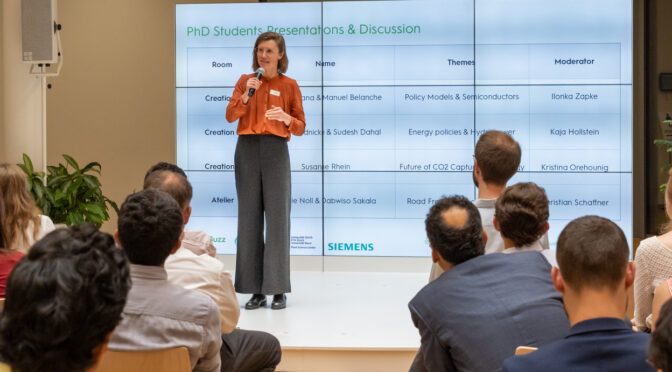
Bessie Noll, currently PhD fellow in Response Doctoral Program
Background
The transport sector is one of the largest energy consumers and plays a crucial role in mitigating climate change. With recent cost reductions for battery electric vehicles, a fundamental transformation of the predominant drive technologies towards low-carbon technologies seems possible. However, there is great uncertainty about the speed and outcome of the transition, since a variety of drive technologies still compete for low-carbon road mobility and transport and with increasing modal shifts towards rail.
What evidence is useful for policymaking?
With a novel model for global projections of technology mixes for mobility and transport until 2040 we could contribute to policy advice through addressing uncertainty in freight transport decarbonization. Embedding a probabilistic discrete choice model within a system-dynamic model architecture, we will consider feedbacks between technology deployment, cost improvement and further factors. The freight sector represents a critical analysis point for emissions reduction and an anticipated option for electrification given the likely definitive trend towards total electrification in the passenger transport sector. Entry barriers for alternative fuel freight vehicles in the market, however, include high cost of infrastructure and high capital investment as the technologies required to
power long-range road transport, for instance, are not yet cost effective.
The developed model will address the positive economic feedback effects of technological development and deployment but perhaps more importantly, identify policy intervention points that would effectively assist a shift from conventional to alternative fuel drive-train technologies. In collaborating with the Swiss Energy Foundation (SES), avenues and best practices for policy intervention will be readily experienced and discussed first-hand by Bessie during the secondment and can thus be incorporated in the model architecture and assessment. Finally, upon completion, quantitative results as well as the model itself will be open sourced for future researchers to build upon and for other relevant industry stakeholders to reference.
Current policy-related publications:
Energy Blog 福島から10年後 – When institutional incumbents hinder energy transitions: Japan’s energy story (March 2021)
Bessie Noll, Tonja Iten, Fabian Lüscher (2021). A SYNTHESIZED ANALYSIS OF THE STATE OF THE “ADVANCED” US NUCLEAR INDUSTRY. Schweizerische Energiestiftung.
Bessie Noll’s research project is on the energy transition in the transport sector – assessing the impact of European and national policies on future drive technology mixes, energy use, and emission pathways at ETH Zurich is together with Prof. Tobias Schmidt, Department of Humanities, Social and Political Sciences at the Energy Politics Groups and in collaboration with the Swiss Energy Foundation (SES), Switzerland.
(DP) «RESPONSE – to society and policy needs through plant, food and energy sciences» funded by the European Union’s Horizon 2020 research and innovation program under the Marie Skłodowska-Curie Grant Agreement No 847585.

